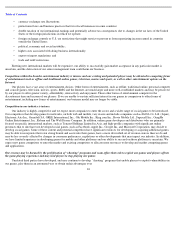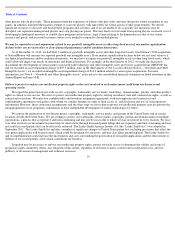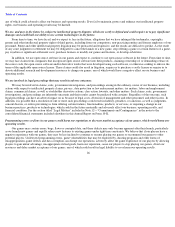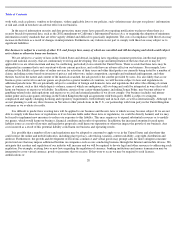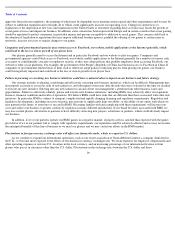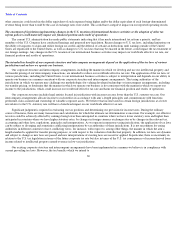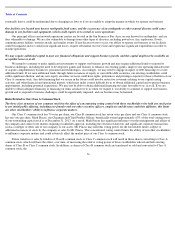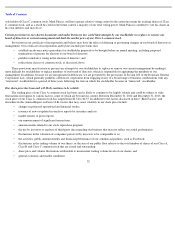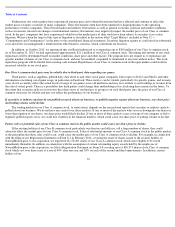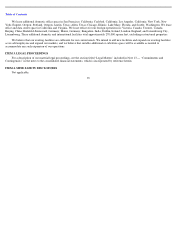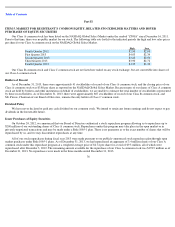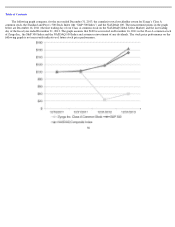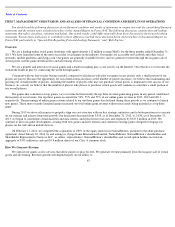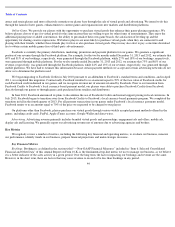Zynga 2013 Annual Report Download - page 38
Download and view the complete annual report
Please find page 38 of the 2013 Zynga annual report below. You can navigate through the pages in the report by either clicking on the pages listed below, or by using the keyword search tool below to find specific information within the annual report.
Table of Contents
Class B common stock will be entitled to rights with respect to the registration of such shares under the Securities Act pursuant to an investors’
rights agreement. If these holders of our Class B common stock, by exercising their registration rights, sell a large number of shares, they could
adversely affect the market price of our Class A common stock. If we file a registration statement for the purposes of selling additional shares to
raise capital and are required to include shares held by these holders pursuant to the exercise of their registration rights, our ability to raise capital
may be impaired. Sales of substantial amounts of our Class A common stock in the public market, following the release of lock-up agreements,
the filing of additional registration statements, or otherwise, or the perception that these sales could occur, could cause the market price of our
Class A common stock to decline.
If we are unable to implement and maintain effective internal control over financial reporting in the future, the accuracy and timeliness of
our financial reporting may be adversely affected.
If we are unable to maintain adequate internal controls for financial reporting in the future, or if our auditors are unable to express an
opinion as to the effectiveness of our internal controls as required pursuant to the Sarbanes-
Oxley Act, investor confidence in the accuracy of our
financial reports may be impacted or the market price of our Class A common stock could be negatively impacted.
The requirements of being a public company may strain our resources, divert management’s attention and affect our ability to attract and
retain qualified board members.
We are subject to the reporting requirements of the Securities Exchange Act of 1934, as amended (the “Exchange Act”), the Sarbanes-
Oxley Act, the Dodd-Frank Act, the listing requirements of the NASDAQ Global Select Market and other applicable securities rules and
regulations. Compliance with these rules and regulations has increased and will continue to increase our legal and financial compliance costs,
make some activities more difficult, time-consuming or costly and increase demand on our systems and resources. The Exchange Act requires,
among other things, that we file annual, quarterly and current reports with respect to our business and operating results.
As a result of disclosure of information in this Annual Report on Form 10-K and in our other public filings with the SEC as required of a
public company, our business and financial condition have become more visible, which we believe may result in threatened or actual litigation,
including by competitors and other third parties. If such claims are successful, our business and operating results could be harmed, and even if
the claims do not result in litigation or are resolved in our favor, these claims, and the time and resources necessary to resolve them, could divert
the resources of our management and harm our business and operating results.
We do not intend to pay dividends for the foreseeable future.
We have never declared or paid any cash dividends on our common stock and do not intend to pay any cash dividends in the foreseeable
future. Any determination to pay dividends in the future will be at the discretion of our board of directors. Accordingly, investors must rely on
sales of their Class A common stock after price appreciation, which may never occur, as the only way to realize any future gains on their
investments.
ITEM 1B. UNRESOLVED STAFF COMMENTS
None.
ITEM 2. PROPERTIES
We own our San Francisco, California corporate headquarters, an office building of approximately 660,000 square feet. We use
approximately 450,000 square feet for our operations and lease most of the remainder to third-party, non-affiliated, tenants under leases that
range in terms from month-to-month to terms through 2021. The San Francisco facility currently accommodates our principal executive,
development, engineering, marketing, business development, human resources, finance, legal, information technology and administrative
activities.
34


